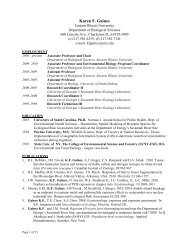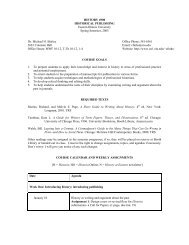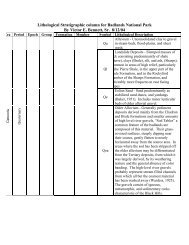Handed My Own Life Annie Dillard - Eastern Illinois University
Handed My Own Life Annie Dillard - Eastern Illinois University
Handed My Own Life Annie Dillard - Eastern Illinois University
You also want an ePaper? Increase the reach of your titles
YUMPU automatically turns print PDFs into web optimized ePapers that Google loves.
"Katherine S. Newman, an anthropology professor at Columbia <strong>University</strong> published this proposal in 1995 inthe Brookings Review, a journal concerned with public policy. Addressing fast-food corporate executives andmanagers, Newman tries to convince them to adopt policies that would help their employees find better jobs.Her proposal comes out of her two-year study of fast-food workers in Harlem in which she learned thatworkers experience great difficulty finding better jobs because they lack the kinds of "social networks" thatmiddle-class workers depend on for job information and referrals. As you read Newman's proposal, noticewhy the social networks that inner-city fast-food workers do have fail to lead to better jobs and evaluatewhether you think the proposed solution-an "employer consortium" (a group of cooperating employers—willprovide the type of networks that the workers need.11Dead-End Jobs: A Way OutKatherine S. NewmanMillions of Americans work full-time, year-round in jobs that still leave them stranded in poverty. Though theypound the pavement looking for better jobs, they consistently come up empty-handed. Many of theseworkers are in our nation's inner cities.I know, because I have spent two years finding out what working life is like for 200 employees-abouthalf African-American, half Latino-at fast food restaurants in Harlem. Many work only part-time, though theywould happily take longer hours if they Could get them. Those who do work full-time earn about $8,840(before taxes)-well below the poverty threshold for a family of four.These fast food workers make persistent efforts to get better jobs, particularly in retail and higherpaidservice-sector occupations. They take civil service examinations and apply for jobs with the electriccompany or the phone company. Sometimes their efforts bear fruit. More often they don't.A few workers make their way into the lower managerial ranks of the fast food industry, where wagesare marginally better. An even smaller number graduate into higher management, a path made possible bythe internal promotion patterns long practiced by these firms. As in any industry, however, seniormanagement opportunities are limited. Hence most workers, even those with track records as reliableemployees, are locked inside a low-wage environment. Contrary to those who preach the benefits of workand persistence, the human capital these workers build up—experience in food production, inventorymanagement, cash register operation, customer relations, minor machinery repair, and cleaning—does notpay off. These workers are often unable to move upward out of poverty. And their experience is not unusual.Hundreds of thousands of low-wage workers in American cities run into the same brick wall. Why? And whatcan we do about it?Stagnation in the Inner CityHarlem, like many inner-city communities, has lost the manufacturing job base that once sustained itsneighborhoods. Service industries that cater to neighborhood consumers, coupled with now dwindlinggovernment jobs, largely make up the local economy. With official jobless rates hovering around 18 percent(14 people apply for every minimum wage fast food job in Harlem), employers can select from the very top ofthe preference "queue." Once hired, even experienced workers have virtually nowhere to go.One reason for their lack of mobility is that many employers in the primary labor market outsideHarlem consider "hamburger flipper" jobs worthless. At most, employers credit the fast food industry withtraining people to turn up for work on time and to fill out job applications. The real skills these workers havedeveloped go unrecognized. However inaccurate the unflattering stereotypes, they help keep experiencedworkers from "graduating" out of low-wage work to more remunerative employment. . . .As Harry Holzer, an economist at Michigan State <strong>University</strong>, has shown, "central-city" employersinsist on specific work experience, references, and particular kinds of formal training in addition to literacyand numeracy skills, even for jobs that do not require a college degree. Demands of this kind, more stringentin the big-city labor markets than in the surrounding suburbs, clearly limit the upward mobility of the workingpoor in urban areas. If the only kind of job available does not provide the "right" work experience or formaltraining, many better jobs will be foreclosed.Racial stereotypes also weaken mobility prospects. Employers view ghetto blacks, especially men,as a bad risk or a troublesome element in the workplace. They prefer immigrants or nonblack minorities, ofwhich there are many in the Harlem labor force, who appear to them more deferential and willing to work
















